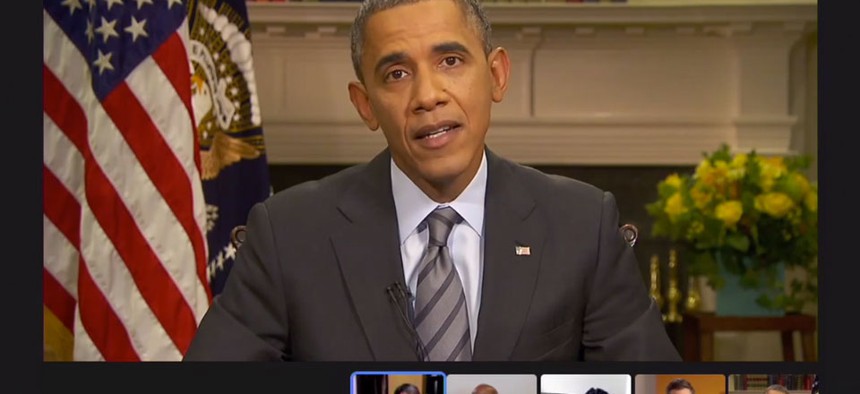Confused by Obamacare? Ask the President

The White House via YouTube
A virtual hangout sent one woman’s Obamacare questions straight to the White House; others are still confused.
When a Kentucky mother of two complained to the president in a virtual chat on Friday that she’d received conflicting information about whether her 10-year-old son could continue to see a specialist under a new Obamacare plan, he offered a standard response, noting that the HealthCare.gov website is improving and call centers are giving confused insurance seekers guidance.
Obama also made a promise only a handful of people can make, though.
“What I’ll do first, right away, is make sure that somebody out here in the White House calls you directly and I promise you not only will they be confident but it will be the right answer,” the president said.
He later added: “You, Rebecca, since you’re talking to the president directly, will get, I guarantee you, a firm answer by the end of the day.”
The exchange points out many of the benefits, and some of the pitfalls, of elected officials’ virtual hangouts and town halls with citizens.
On the positive side of the ledger, there’s clearly nothing like talking directly to the president to make sure your problem gets addressed.
There’s also likely some benefit to the president putting a human face on policy issues he mostly deals with in abstract terms. And there’s an added benefit when those human faces come thorugh a third party rather than by the president’s own handlers. Google organized the president’s “virtual road trip” via its Google+ hangout feature.
In addition to the mother from Kentucky -- which, incidentally, offers its own state-based Obamacare exchange that’s only reliant on HealthCare.gov for a backend data exchange -- the president spoke to a Milwaukee fry cook supporting a family on $7.25 an hour who’s gone on strike for union benefits, a Muslim woman concerned about the National Security Agency’s surveillance programs and six other people over the course of about 40 minutes.
On the downside, though, the president’s conversation underscored a problem with such virtual citizen meetings: While they’re great at bringing attention to the needs of an individual, they do little to explicate or fix systemic problems.
The president’s advice to people facing the same confusion as the Kentucky mother was to turn to government call centers that can help people through the confusing sign up process. The mother began to complain that she’d called those centers and received bad information, but the Google moderator moved on to the next questioner.
Another questioner asked the president about a Jan. 14 federal appeals court ruling that shook the concept of net neutrality by allowing Internet Service Providers to offer faster Internet for streaming content providers.
Obama said he and Federal Communications Commission Chairman Tom Wheeler both support the concept of net neutrality and that the commission is looking at legal and regulatory paths to pare back the court’s decision.
“It’s something I’ve cared deeply about ever since I ran for office,” Obama said, “in part because my own campaign was empowered by a free and open Internet and the ability for citizens all across this country to engage and create and find new ways and new tools to mobilize themselves. A lot of that couldn’t have been done if there were a bunch of commercial barriers and roadblocks.”






